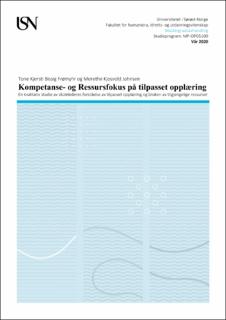Kompetanse- og Ressursfokus på tilpasset opplæring En kvalitativ studie av skolelederes forståelse av tilpasset opplæring og bruken av tilgjengelige ressurser
Master thesis
Permanent lenke
https://hdl.handle.net/11250/2679169Utgivelsesdato
2020Metadata
Vis full innførselSamlinger
- Master i pedagogikk [208]
Sammendrag
The purpose of this study was to explore the school leaders' understanding of customized education and how they utilize their available resources. Inclusive education has been one of the Norwegian schools' biggest challenges for the past 40 years. The concept has historical roots in general pedagogy and is a high priority in the Norwegian school curriculum. Political guidelines and influences have influenced the understanding and practice of the concept. In the time following the closure of the special schools, in the mid-1970s, it was stated that all pupils should have the right to education according to their abilities and prerequisites, in an inclusive school. Inclusive education should embrace both regular and special education. Special education often increases the need for extra resources, both in the form of financial resources and special educational competence. The regulations provide room for action for local school authorities and the individual school, in terms of follow-up of pupils. Nevertheless, there are an increasing number of children in the Norwegian school who do not benefit from ordinary education. If all children are to receive equal education, competence and cooperation will be an important factor in the implementation of all teaching. Through the following issue: "How do school principals understand the use of their available resources to promote tailored education for all students, both academically and socially?". In order to answer the problem, we examine how school principals understand the concept of tailored training, whether they feel that there is a common understanding within the staff group, whether they have satisfactory competence and the extent to which they utilize their resources through their scope of action. Method: We selected a qualitative study and the data was obtained through focus group interviews with five school principals from primary school. The school leaders' experience and competence vary. Transcripts from our focus group interviews formed the basis for a hermeneutic and phenomenological approach through analysis and interpretation of school leaders' statements. Findings: The findings show that Inclusive education is understood differently and thus practiced differently. Furthermore, the findings show that school principals believe that special education is something other than customized education. It is clear that customized education is about level division, and to gather all students into the whole class, so that resources are used efficiently and appropriately. The frameworks have a major impact on how resources are distributed. It is clear that school principals understand the use of available resources differently. School leaders must act in their own space of action to adapt education, when they are in a demanding field of tension between the student's level, the academic and financial resources. School leaders feel that the inner framework of the "school code" influences the school's common practice and utilization of the available resources. The school's internal practice is influenced by the external framework. The wide The special educational competence should come closer to the students. Lack of resources can have consequences for the student's learning outcomes and it shows a clear need for interdisciplinary collaboration and resource teams in schools. In this way, preventive work can be done and students' skills and abilities can be met, both professionally and socially.
